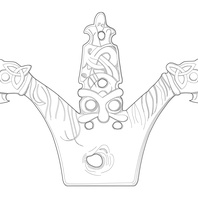
Viking Designs
Drawing of a Mystery Item
This is a drawing of a gilded, copper alloy object that was clearly affixed to something else. The gilding shows that it was high status but its function remains a mystery.
Read More
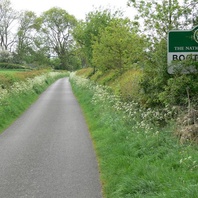
Viking Names
Boothorpe
Boothorpe, in the West Goscote Hundred of Leicestershire, probably comes from the Old Danish male personal name Bo (Old Norse Búi) and the Old Norse element þorp ‘outlying farm, settlement’. Alternatively, the first element of the place-name could be Old English boga or Old Norse bogi ‘bow’ which would be topographically appropriate because the settlement lies on a curving hilltop.
Read More
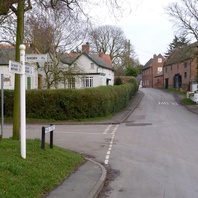
Viking Names
Shoby
Shoby, in the East Goscote Hundred of Leicestershire, is a Scandinavian compound from the Old Norse male personal name Sigvald, a reflexive of Sigvaldr/Sigvaldi and the Old Norse element by ‘a farmstead, a village’. It may replace an earlier place-name meaning ‘Sigewald’s fortification’ from Old English byrig (dative singular of burh).
Read More
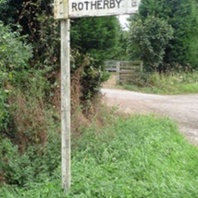
Viking Names
Rotherby
Rotherby, in the East Goscote Hundred of Leicestershire, comes from the Old Norse male personal name Hreiðarr and the Old Norse element by ‘farm, settlement’. The personal name here might be the same as that in Rearsby, Leicestershire. Later forms of the name show influence from Middle English rother ‘an ox’. Rotherby is now a joint parish with Hoby.
Read More
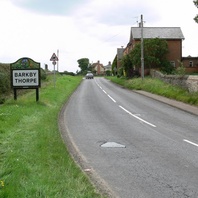
Viking Names
Barkby Thorpe
Barkby Thorpe, in the East Goscote Hundred of Leicestershire, is originally a simplex name from Old Norse þorp ‘a secondary settlement, a dependent outlying farmstead or hamlet’. This was a secondary settlement dependent on adjoining Barkby, thus the affix.
Read More
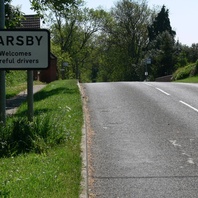
Viking Names
Barsby
Barsby, in the East Goscote Hundred of Leicestershire, likely comes from the Old Norse male personal name Barn, originally a byname from Old Norse barn ‘a child’, and the Old Norse element by ‘a farmstead, a village’. Alternatively, the first element may be barn itself.
Read More
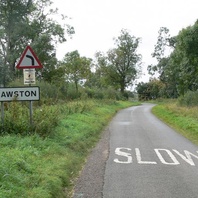
Viking Names
Slawston
Slawston, in the Gartree Hundred of Leicestershire, is an Anglo-Scandinavian hybrid from the Old Norse male personal name Slagr (Middle English genitive singular Slages), which appears to be originally a byname either from slœgr ‘sly, cunning’ or, less likely, from slagr ‘a blow, a stroke’ and the Old English element tun ‘farm, settlement’. This village might have been an Anglian settlement that was appropriated by a Scandinavian from the Viking army which disbanded in the area around 877 rather than a later manorial creation. Slawston is near Blaston, another township with a hybrid Old English/Old Norse place-name which could represent a similar appropriation.
Read More
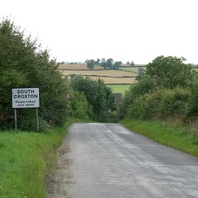
Viking Names
South Croxton
The first element of South Croxton, in the East Goscote Hundred of Leicestershire, likely comes from the Old Danish male personal name Krok (Old Norse Krókr, Middle English genitive singular Crokes), originally a byname meaning ‘crooked-back’, or possibly ‘crooked-dealer’ related to Old Norse krókr ‘hook’. Alternatively the first element could be Old English croc ‘a crook’, that is relating to a location situated in a nook or bend of land. The second element of the place-name is Old English tun ‘an enclosure; a farmstead; a village; an estate’. The Middle English affix suð ‘south’ distinguishes South Croxton from Croxton Kerrial in the Framland Hundred.
Read More
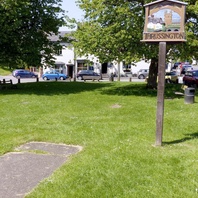
Viking Names
Thrussington
Thrussington, in the East Goscote Hundred of Leicestershire, is an Anglo-Scandinavian hybrid from the common Old Norse male personal name Þorsteinn and Old English tun ‘an enclosure; a farmstead; a village; an estate’.
Read More
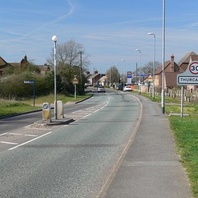
Viking Names
Thurcaston
Thurcaston, in the West Goscote Hundred of Leicestershire, is a hybrid name. The first element comes from the Old Norse male personal name Þorketill, common in Norway, Iceland, Sweden and Denmark throughout the whole of the medieval period and also common in Normandy before 1066. Þorketill is an older version of the Old Norse male personal name Þorkell. The second element is Old English tun ‘farm, settlement’.
